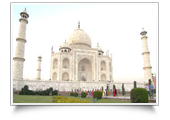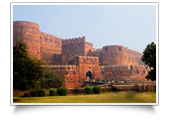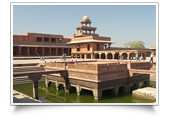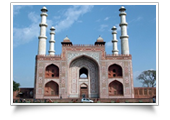|
|
|
|
 |
 |
|
Agra |
 |
|
|
|
There are quite a few worthwhile places to visit in Agra and around, apart from India's most famous monument -- the Taj Mahal. The many interesting remnants of the Mughal era will surprise you and the crazy, congested bazaars of the Old City will fascinate you. It's possible to experience village life and get close to nature as well. |
|
| FAMOUS Places IN Agra |
|
| TAJ MAHAL |
 The Taj Mahal is one of the most famous tourist attractions in India and across the world. It's one of the Seven Wonders of the World. Completed in 1653, The Taj Mahal was built by Mughal Emperor Shah Jahan in memory of his beloved wife Mumtaz Mahal, as a symbol of eternal love. The Taj Mahal is one of the most famous tourist attractions in India and across the world. It's one of the Seven Wonders of the World. Completed in 1653, The Taj Mahal was built by Mughal Emperor Shah Jahan in memory of his beloved wife Mumtaz Mahal, as a symbol of eternal love.
Taj Mahal is built on a red sandstone base, topped by a huge white marble terrace on which rests the dome flanked by four tapering minarets. The floors and walls have intriguing calligraphy and mosaic work adorned with precious stones. Open all days (except Friday and public holidays) from sunrise to sunset. Open at Night from 8:30 pm to 12:30 am on a Full moon night, two days before and after |
|
| AGRA FORT |
 Agra Fort is one of the finest Mughal forts in India. It was originally a brick fort that was held by a clan of Rajputs. However, it was subsequently captured by the Mughals and rebuilt by Emperor Akbar, who decided to shift his capital there in 1558. There are many buildings inside, including mosques, public and private audience halls, palaces, towers, and courtyards.
Agra Fort is one of the finest Mughal forts in India. It was originally a brick fort that was held by a clan of Rajputs. However, it was subsequently captured by the Mughals and rebuilt by Emperor Akbar, who decided to shift his capital there in 1558. There are many buildings inside, including mosques, public and private audience halls, palaces, towers, and courtyards.
Another attraction is the evening sound and light show that recreates the Fort's history. Distinguished buildings in the fort are the Pearl Mosque, Jahangir's Palace, Diwan-e-Am, Diwan-e-Khas (public and private audience halls), Shish Mahal, Musammam Burj and the Khas Mahal. The fort is semi-circular shaped, flattened on the east with a long, nearly straight wall facing the river. |
|
| FATEHPUR SIKRI |
 Founded by the great Mughal emperor Akbar, in the year 1569, Fatehpur Sikri served as the capital of the Mughal Empire during the years 1571-1585. Named as Fateh (meaning victory) in the beginning, it was later known as Fatehpur Sikri. It was home for the birth of navaratnas (9 jewels). It stands as a representation of the infamous Mughal architecture with unique designs and artworks. Founded by the great Mughal emperor Akbar, in the year 1569, Fatehpur Sikri served as the capital of the Mughal Empire during the years 1571-1585. Named as Fateh (meaning victory) in the beginning, it was later known as Fatehpur Sikri. It was home for the birth of navaratnas (9 jewels). It stands as a representation of the infamous Mughal architecture with unique designs and artworks.
The building was made of red stones and Akbar intended to revive the Persian court splendors made by his ancestor Timur, but eventually it came through as the classic Indian embellishments. The Fatehpur Sikkim was deserted after its completion due to natural calamities of insufficient water further triggered by the proximity of the Rajputana areas. The city is a piece of art that surrounds brilliant works by great minds of the strong Mughal period influenced by the emperors. |
|
| AKBAR's TOMB |
 Built solely for the great Mughal emperor, the Akbar Tomb was built in 1605-1613. It covers a good area of 119 acres in the Sikandra. It was Akbar himself who initiated the works in 1600 as per the Tartary tradition. Located in the suburbs, about a kilometer away lies the tomb of Miriam, Akbar's wife. The southern gate is similar to those of the Taj Mahal with 4 white marble chhatri and also serves as the entrance to the tomb. Built solely for the great Mughal emperor, the Akbar Tomb was built in 1605-1613. It covers a good area of 119 acres in the Sikandra. It was Akbar himself who initiated the works in 1600 as per the Tartary tradition. Located in the suburbs, about a kilometer away lies the tomb of Miriam, Akbar's wife. The southern gate is similar to those of the Taj Mahal with 4 white marble chhatri and also serves as the entrance to the tomb.
A wall of 105m square surrounds the tomb. The fake tomb is located in the marble pavilion placed inside a 4 tier pyramid building while the true tomb is safely kept in the basement. The building is made up of red sandstones with touches of white marble. One of India's greatest assets, the tomb is an attractive tourist spot, with people eager to see the tomb flooding the place. |
|
|
|
|
|
|
